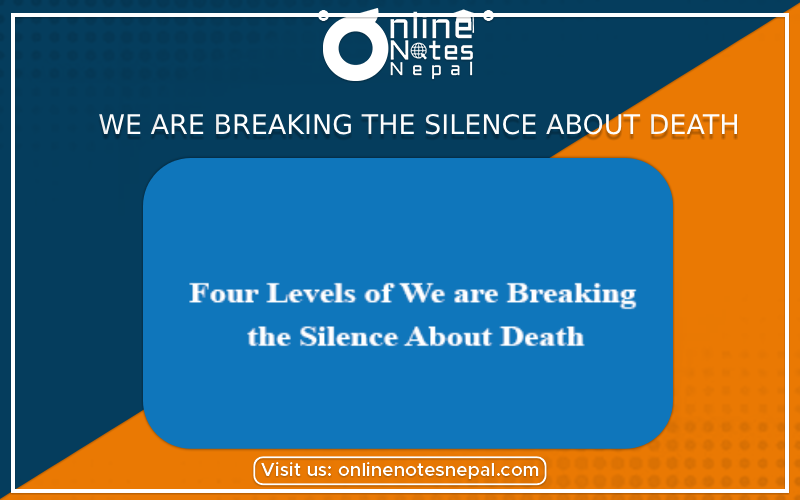Published by: Dikshya
Published date: 04 Jul 2023

1. Literal Comprehension:
When Elizabeth Kubler-Ross started looking for a dying patient in the hospital but couldn't find any, she decided to start working with them. When the nurse is questioned about it, she learns that even the doctors find it uncomfortable to discuss death and that they have never witnesseda dying patient. The dead victim's bodies simply appeared to dissapear from the hospital. While she worked with the patients, she witnessed some who were willing to die even when they were being collapsed. After getting to know the people who are facing mortality, she devises a progression for them that includes Denial, Anger, Bargaining, Depression and Acceptance. When someone firstlearns they are going to die, their first response is to deny it. They become angry with doctors and are curious to know why is it happening. The pray to god and bargain for their lives and soon feel hopeless and have pessimistic feeling towards their life. They become depressed. At the end they accept their death and wait their death to come.
When a person is close to death, he/she initially denies it or responds, "NO". He finds it simple to endure the impact of death because denial. At the unconcious level, nobody ever has the notion that they will pass away. He gains hope from their rejection. Kubler proposes that we talk to the patient about dying and make plans to finish all tasks. The story wants to tell us that dying patients should be informed about what's happening next rather than keeping it a secret because death is inevitable. Death is a natural process and hence being afraid of it is worthless. To make it easier they should be pre-informed and let them accept it.
The text awares us about how we should inform the patients about their condition and what's coming next to them. But directly telling a patient about their death could possibly worsen the situation even if it was meant to be better. So, I have some questionable aspects:
- How can we easily predict the stages of death?
- The story talks about bargaining. What better will bargaining with the God do?
- Can people really easily accept their death?
I had an aunt in Biratnagar. She was brought to Kathmandu Cancer hospital for her cancer treatment. We found that her cancer was almost in its last stage and she could only live for few months. When she was told about her condition, she cried, shouted and said she will be alright and the doctors are liars. She began to beg god to grant her a healthy life soon. She stopped eating properly and stopped talking to people like she did. And finally she accepted that she will be gone soon so she began to smile more often and meet everyone with a heavy heart but she looked happy. She might have accepted her death. The doctor said she had a month but she lived for more than a month but sadly passed away.